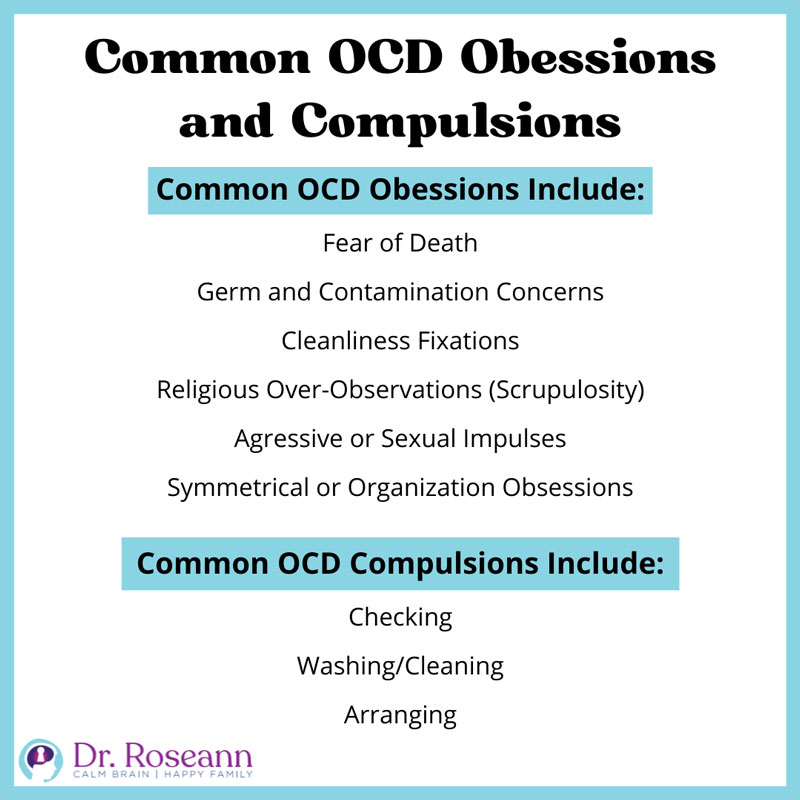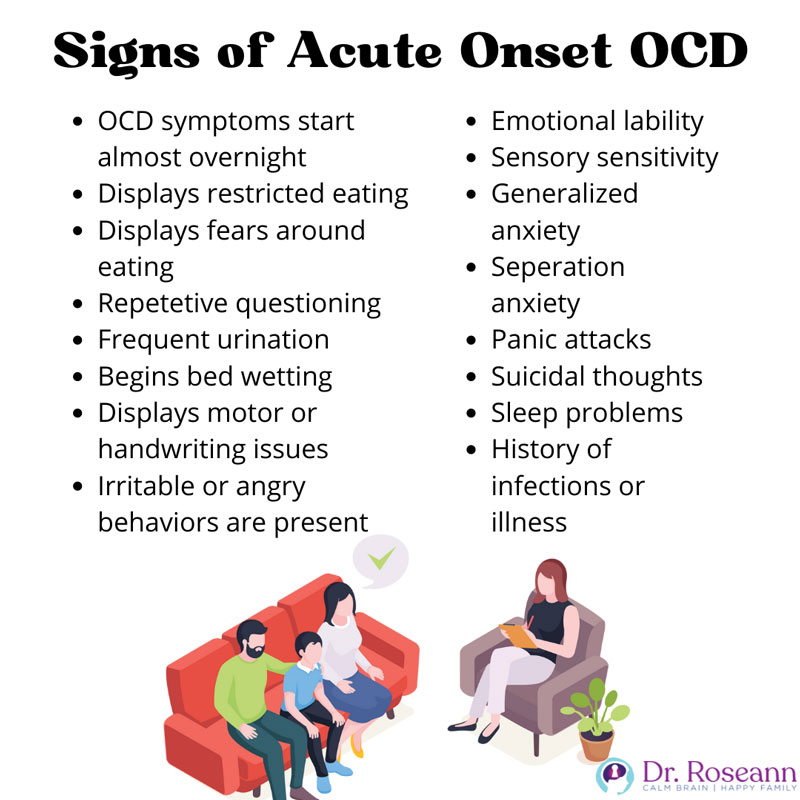Not everyone who has PANS or PANDAS has Obsessive Compulsive Disorder (OCD) but a significant portion of kids with OCD also have PANS/PANDAS and vice versa. The onset of symptoms can be sudden but for many OCD often starts with signs of anxiety before the OCD symptoms become more apparent due to the internalizing components of the disorder.
As we learn more about the effect of infectious disease on the brain, we now know that there can be both a pediatric acute onset or adult onset of OCD or other neuropsychiatric symptoms with PANS/PANDAS.
Is it PANS or OCD?
Determining why your child has OCD can be an incredibly long and frustrating journey. When your child has a sudden onset of OCD, it can be scary and overwhelming.
That scary almost overnight intense anxiety, obsessions and compulsions leaves most parents wondering if their kid is “crazy “or “had a demonic possession.” Their child’s frightening behaviors caused them to seek assistance quickly because they have no choice but to address these erratic and emotional behaviors.
In contrast, when children develop OCD over a period of time, making a connection to the root cause can be even more arduous. Between the often internalized behaviors of OCD and the waxing and waning signs of an infectious disease source, the connection between infections and toxins on brain and behavior isn’t so easy to make when you are in deep in helping your child.
Sadly, in both cases understanding and resources are poor, which means that getting the right help is hard to put it mildly. So few professionals understand even what OCD is let alone that there are sources other than genetics or help besides psychiatric meds or talk therapy.
The biggest takeaway for a parent of a child with PANS/PANDAS and OCD is that they must address the infections, inflammation and OCD behaviors. Just addressing infection won’t stop the OCD. It doesn't go away with antimicrobial treatment alone, you give your child the therapeutic tools to talk back to their OCD.
What are the symptoms of OCD?
OCD is a clinical disorder where a person or child experiences intrusive thoughts and fears (obsessions) leading to compulsive behaviors. Individuals with OCD engage in compulsive behaviors attempting to end the obsessions, decrease distress and worry, or stop perceived negative things from happening. It is all about compulsive mental and behavioral rituals needed to reduce uncomfortable and anxious feelings.
OCD shows itself differently for each person depending on their intensity level and type of obsessions and compulsions and it can wax and wane depending on physical and emotional stressors in the person’s life.
Understanding the neuroscience of OCD and the diagnostic criteria is important for PANS/PANDAS parents dealing with OCD.
Common OCD obsessions include:
- fear of death
- germ and contamination concerns
- cleanliness fixations
- religious over-observations (scrupulosity)
- aggressive or sexual impulses
- symmetrical or organization obsessions
Common OCD compulsions include:
- checking
- washing/cleaning
- arranging

Acute Onset OCD
PANDAS and PANS cause a sudden onset of severe OCD symptoms, as well as changes in a child's behavior, cognitive and motor functions.
Signs of Acute Onset OCD
- OCD symptoms start almost overnight
- Displays restricted eating
- Displays fears around eating
- Repetitive questioning
- Frequent urination
- Begins bed wetting
- Displays motor or hand writing issues
- Irritable or angry behaviors are present
- Emotional lability
- Sensory sensitivity
- Generalized anxiety
- Separation anxiety
- Panic attacks
- Suicidal thoughts
- Sleep problems
- History of infections or illness

Tucker’s Story
Tucker and his two sisters all had PANS. For all three, it started with a sudden onset of OCD. After what his parents describe as a “nightmare” to find the right medical help, they were able to get the infections for all three kids under control.
Tucker was the only one of his siblings who still struggled with OCD. His parents kept thinking that if they better addressed the lingering infections and the physical damage to his gut, that the symptoms would resolve but they didn’t.
Once in our BrainBehaviorReset™ Program, they were able to see on a QEEG the impact on long term compounded stress and anxiety on Tucker’s brain. OCD results from the nervous system responding to a perceived or real stressor with compulsive, obsessive and ritualistic behaviors. Science shows us that this negative reinforcement loop reinforces the behaviors and until a person learns to stop feeding the OCD, the behaviors only grow stronger.
In Tucker‘s case, with neurofeedback, nutrients, parent education and ERP therapy for OCD in an innovative program, Tucker was able to completely eliminate all OCD symptoms. He and his parents learned to stop “feeding the OCD” and broke free from obsessive, intrusive thoughts that were controlling his life. They got their happy kid and family back!
Strep Linked to OCD
Pediatric autoimmune neuropsychiatric disorder associated with streptococcus is something that has been noted in the literature for decades.
Pediatric Autoimmune Neuropsychiatric Disorder Associated with Streptococcus (PANDAS) is the sudden, rapid-onset of obsessive compulsive thoughts, behaviors and rituals, as well as possible movement and behavioral abnormalities, following a Streptococcus pyogenes or Group A Strep infection. For some, strep bacteria and Scarlet Fever may lead to rheumatic fever some one to five weeks later according to the CDC.
Studies at the National Institute of Mental Health (NIMH) have shown that some cross-reactive antibodies target the brain, which causes OCD, tics, and the other neuropsychiatric symptoms of PANDAS.
I recall learning about OCD resulting from strep throat when I was in graduate school in the mid-1990’s. I have a close friend whose husband had it in the 1970’s and their daughter got it three decades later. Yet, most medical and mental health professionals are unaware how to diagnose and treat this increasingly common disorder. PANS and PANDAS is on the rise with one child and every 150 to 200 having it.
It’s surprising there is such a controversy about such an obvious medically rooted mental health condition but there is. Ultimately, ignorance and an antiquated mental health system fuels the unacceptable treatment of our children with PANS and PANDAS.
When Should You Consider PANS and PANDAS When Your Child Has OCD?
Always. In our Ridgefield, CT center more than 80% of our OCD clients have inflammation- based OCD that result from infections and toxins.
As part of our intake process we statistically analyze brainwave data, which gives us objective data about how the brain is functioning. When a client has a QEEG brain map, four brain profile phenotypes present: two are inflammation based and two reflect a more genetic anxiety disorder and OCD profile. This rich data gives us indications of the most efficacious treatment protocol, so kids and families don’t have to suffer so long.
Common sense tells us that unless you are treating the root cause, it’s not possible to get better and that is why a QEEG brain map and Brain Check are the cornerstone of our BrainBehaviorReset™ Program.
Is It PANDAS or PANS?
PANS and PANDAS are different disorders that both have a sudden onset of neuropsychiatric symptoms. Understanding the difference between PANS and PANDAS is a necessary part of the journey.
Once an infection enters the system, the overactivated immune system begins to break down and it is very common for children to have multiple infections and toxins affecting their brain and body. So one may start out with a strep infection fueling brain inflammation, but then typically several infections and toxins present.
The gut-brain connection is especially relevant here as stress, toxins, viruses, bacteria and antibiotics break down the gut. When the all important microbiome shifts from balanced healthy bacteria to unhealthy bacteria dominant, neurotransmitter function is affected. Moreover, these factors break down the lining of the gut further impeding healing of the brain and body.
Running lab work that looks at infections, toxins, inflammation, and nutrient levels is an important part of a treatment plan.
Why do Some Children Get PANS/PANDAS and Others Don’t?
We don’t fully understand why one person can have a virus or Lyme Disease and recover as expected and another gets PANS or PANDAS but we have some strong scientific indicators.
Children and adults who develop PANS or PANDAS often have genetic mutations such as MTHFR that interfere with detoxification, as well as infections and toxic exposures that are often missed. Left unchecked, these infections cause a misdirected immune response where the body attacks itself and inflammation rises.
That inflammation impacts not only the immune system but the autonomic nervous system leading to compounded stressors that in the case of PANS/PANDAS cause limbic system over activation. In other words a brain on fire and a nervous system stuck in fight, flight or freeze.
This domino effect of infections, stress, lack of nutrients and improper detoxification then breaks down the microbiome. This perfect storm leads to a brain under attack with intense psychiatric, behavioral and cognitive issues.
Treating PANS and PANDAS OCD?
It’s important to remember that without a calm brain, the body can’t heal. The body uses all its resources to try to “fight” the stressor, not the infection, so calming the brain is a key to healing.
Every day, I work with families all over the world in my BrainBehaviorReset™ Program who are working with incredible medical providers and not getting better. What’s the missing piece? Not addressing that nervous system stuck in a “rev state.”
Our comprehensive program is filled with the best of science-backed solutions that I have used in the last three decades and not just neurofeedback alone. We use neurofeedback to calm the brain as one part of our BrainBehaviorReset™ Program along with our innovative multi-pronged approach that you won’t find anywhere else. In this premier one-to-one program, we work to calm the brain with science-backed tools and pair it with coaching and psychotherapy to help kids learn new ways to manage intrusive thoughts and fears.

In the case of OCD, we use the gold standard in OCD treatment, Exposure and Response Prevention (ERP). Many therapists refer to OCD as treatment resistant and that really is because they don’t have the deeper training about the neuroscience and the right treatment options for OCD. Cognitive behavioral therapy with OCD just isn’t effective without giving kids opportunities for safe exposures. OCD is very treatable when getting expert guidance and using science-backed tools and therapies.
Psychoimmunolgy shows that only once the brain is calm, can the body’s immune system, hormones, neurotransmitters, microbiome, and cognitive systems go back to normal function. And that is what we do in our BrainBehaviorReset™ Program. I personally lead you through treatment and you also feel the support of a whole team as we guide you to resetting the brain and behavior during what can be a very overwhelming and scary time.
Citations:
Lambert, B., Rickert Hong, M., Capanna-Hodge, R. Giustra-Kozek, J., Stone, L. (2018). Brain Under Attack: A Resource for Parents and Caregivers of Children with PANS, PANDAS and Autoimmune Encephalitis. Amazon
Jaspers-Fayer, F., Han, S., Chan, E., McKenney, K., Simpson, A., Boyle, A., Ellwyn, R., & Stewart, S. E. (2017). Prevalence of Acute-Onset Subtypes in Pediatric Obsessive-Compulsive Disorder. Journal of child and adolescent psychopharmacology, 27(4), 332–341. Mary Ann Liebert, Inc.
Marazziti, D., Mucci, F., & Fontenelle, L. F. (2018). Immune system and obsessive-compulsive disorder. Psychoneuroendocrinology, 93, 39–44. Science Direct.
National Institute of Mental Health (NIMH). PANDAS: Questions and answers. National Institute of Mental Health. Retreived on Januarary 30, 2022
Always remember… “Calm Brain, Happy Family™”
Are you looking for SOLUTIONS for your struggling child or teen?
Dr. Roseann and her team are all about solutions, so you are in the right place!
There are 3 ways to work with Dr. Roseann:
You can get her books for parents and professionals, including: It’s Gonna Be OK™: Proven Ways to Improve Your Child’s Mental Health, Teletherapy Toolkit™ and Brain Under Attack: A Resource For Parents and Caregivers of Children With PANS, PANDAS, and Autoimmune Encephalopathy.
If you are a business or organization that needs proactive guidance to support employee mental health or an organization looking for a brand representative, check out Dr. Roseann’s media page and professional speaking page to see how we can work together.
Dr. Roseann is a Children’s Mental Health Expert and Therapist who has been featured in/on hundreds of media outlets including, CBS, NBC, FOX News, PIX11 NYC, The New York Times, The Washington Post,, Business Insider, USA Today, CNET, Marth Stewart, and PARENTS. FORBES called her, “A thought leader in children’s mental health.”

She is the founder and director of The Global Institute of Children’s Mental Health and Dr. Roseann Capanna-Hodge. Dr. Roseann is a Board Certified Neurofeedback (BCN) Practitioner, a Board Member of the Northeast Region Biofeedback Society (NRBS), Certified Integrative Medicine Mental Health Provider (CMHIMP) and an Amen Clinic Certified Brain Health Coach. She is also a member of The International Lyme Disease and Associated Disease Society (ILADS), The American Psychological Association (APA), Anxiety and Depression Association of America (ADAA) National Association of School Psychologists (NASP), International OCD Foundation (IOCDF) International Society for Neurofeedback and Research (ISNR) and The Association of Applied Psychophysiology and Biofeedback (AAPB).
© Roseann-Capanna-Hodge, LLC 2023
Disclaimer: This article is not intended to give health advice and it is recommended to consult with a physician before beginning any new wellness regime. *The effectiveness of diagnosis and treatment vary by patient and condition. Dr. Roseann Capanna-Hodge, LLC does not guarantee certain results.













